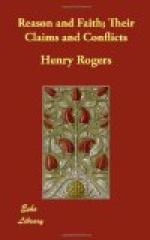It is the same with historic investigations. There are ten thousand facts in history which no one doubts, though the narrators of them may materially vary in their version, and though some of the circumstances alleged may be in appearance inexplicable, but the last thing a man would think of doing, in such cases, would be to neglect the preponderant evidence on account of the residuum of insoluble objections. He does not, in short, allow his ignorance to control his knowledge, nor the evidence which he has not got to destroy what he has; and the less so, that experience has taught him that in many cases such apparent difficulties have been cleared up, in the course of time, and by the progress of knowledge, and proved to be contradictions in appearance only.
It is the same with the conclusions of natural philosophy, when well proved by experiment, however unaccountable for awhile may be the discrepancy with apparently opposing phenomena. No one disbelieves the Copernican theory now; though thousands did for awhile, on what they believed the irrefragable evidence of their senses. Now, let us only suppose the Copernican theory not to have been discovered by human reason, but made known by revelation, and its reception enjoined on faith, leaving the apparent inconsistency with the evidence of the senses just as it was. Thousands, no doubt, would have said, that no such evidence could justify them in disbelieving their own eyes, and that such an insoluble objection was sufficient to overturn the evidence. Yet we now see, in point of fact, that it is not only possible, but true, that the objection was apparent only, and admits of a complete solution. Thousands accordingly receive philosophy—this very philosophy—on testimony which apparently contradicts their senses, without even yet knowing more of it than if it were revealed from heaven. This gives too much reason to suspect, that in other and higher cases, the will has much to do with human scepticism. Nor do we well know what thousands who neglect religion on account of the alleged uncertainty of its evidence could reply, if God were to say to them,
’And yet on such evidence, and that far inferior in degree, you have never hesitated to act, when your own temporal interests were concerned. You never feared to commit the bark of your worldly fortunes to that fluctuating element. In many cases you believed on the testimony of others what seemed even to contradict your own senses. Why were you so much more scrupulous in relation to me?’




